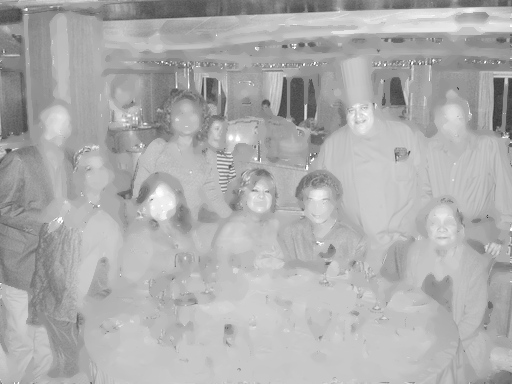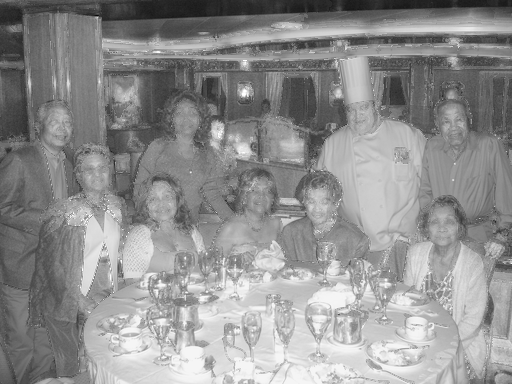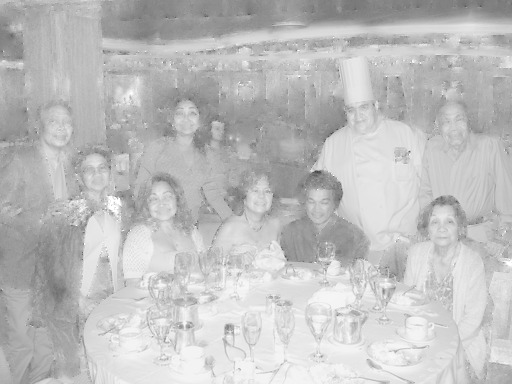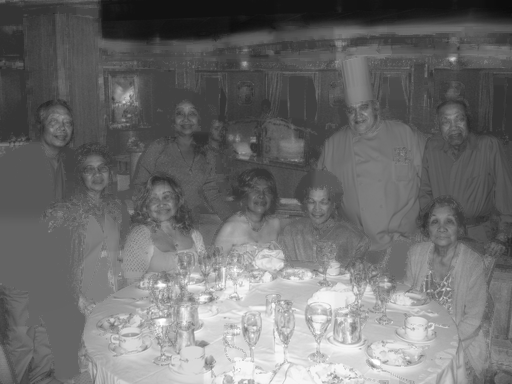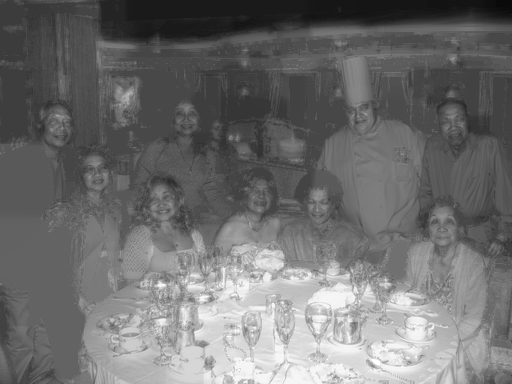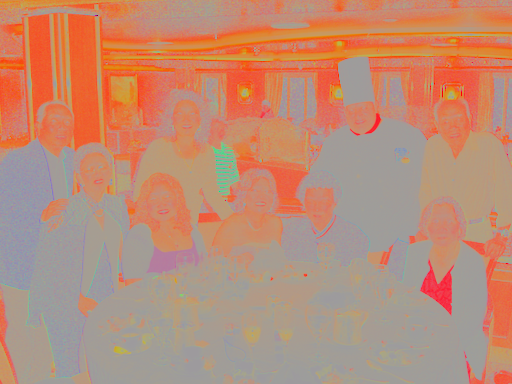Photo Detail
Added: Dec. 26, 2012, 6:40 p.m.
FOV: 48.853° (larger dimension)
Focal length: 1.468 × height
Scene: dining room
Scene correct: True
Whitebalanced: True
Scene label correct votes:
Scene label correct score:
Whitebalance votes:
Whitebalance score:
Flickr user: lyng883
Flickr ID: 326981278
License: Attribution 2.0 Generic (Credit: Lyn Gateley)
Material segmentations
Users were asked to draw around regions of a single type of material.
Vanishing points
Each color corresponds to one vanishing point. Hover over the points on the right to see the full lines.
Whitebalance points
Users were asked to click on points that are white or gray.
Each color corresponds to one user.
- 4.093 (29.7 s)
- 5.675 (23.9 s)
- 2.702 (16.8 s)
- 6.228 (16.0 s)
- 4.013 (12.0 s)
Human reflectance judgements
Our user interface for collecting annotations shows the user an image and asks them, for a particular pair of pixels (indicated with crosshairs and labeled Points 1 and 2), which of the two points has a darker surface color. The user can then select one of three options: Point 1, Point 2, and About the same. We ask users to specify their confidence in their assessment as Guessing, Probably, or Definitely, as was done by [Branson et al. 2010].
We aggregate judgements from 5 users for each pair of points and use the CUBAM machine learning model [Welinder et al. 2010] to model two forms of bias.
See our publication for more details.
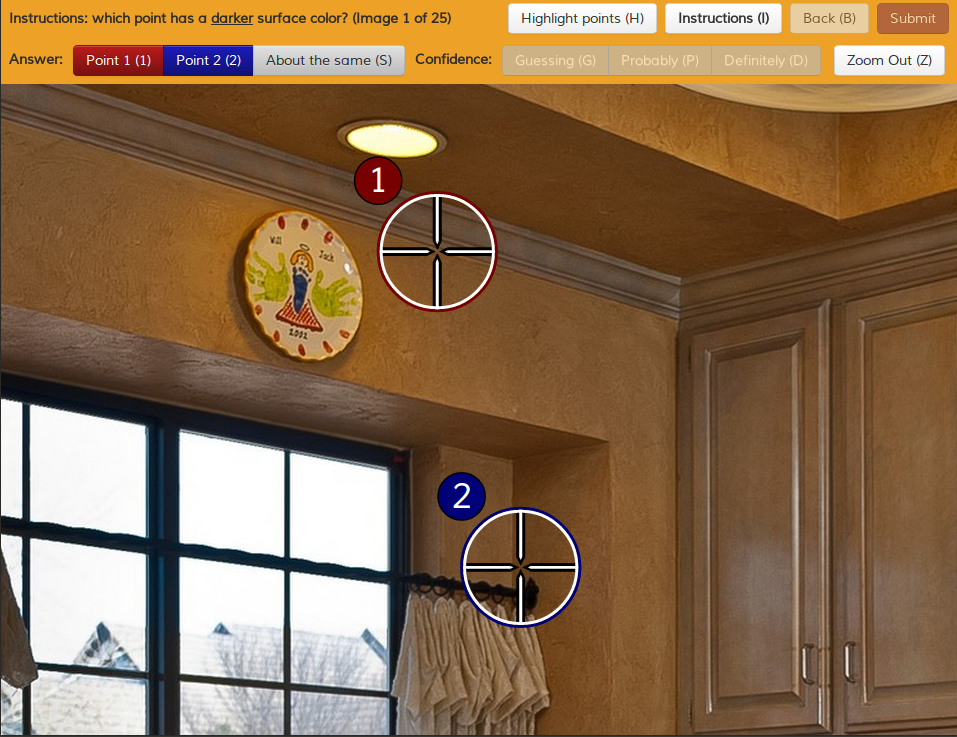
Our user interface
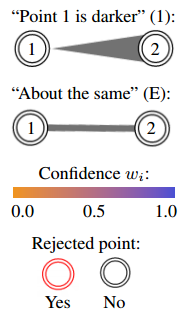
Intrinsic image decompositions
The input image is decomposed into a "reflectance" and "shading" layer. Note that the reflectance layer is listed twice: color (left) and grayscale (center). Decompositions are ordered by error and then runtime (best on top). The parameters for each algorithm are the same for all photos; they are set to the values that produce lowest mean error (WHDR) for all photos. See our publication for more details.
Algorithm: garces2012_clustering
Citation:
Elena Garces, Adolfo Munoz, Jorge Lopez-Moreno, Diego Gutierrez. "Intrinsic Images by Clustering". Computer Graphics Forum (Eurographics Symposium on Rendering). http://www-sop.inria.fr/reves/Basilic/2012/GMLG12/.Parameters:
- km k: 8
- remap gamma 2 2: False
Result:
- Weighted human disagreement rate (WHDR): 14.5% (δ: 0.1)
- WHDR for equal edges only: 0.1386
- WHDR for inequalities only: 0.1501
- Runtime: 6.3 s
Algorithm: shen2011_optimization
Citation:
Jianbing Shen, Xiaoshan Yang, Yunde Jia, Xuelong Li. "Intrinsic Images Using Optimization". Proceedings of Computer Vision and Pattern Recognition (CVPR). http://cs.bit.edu.cn/~shenjianbing/cvpr11.htm.Parameters:
- rho: 1.9
- unmap srgb: False
- wd: 3
Result:
- Weighted human disagreement rate (WHDR): 15.9% (δ: 0.1)
- WHDR for equal edges only: 0.2124
- WHDR for inequalities only: 0.1157
- Runtime: 283.2 s
Algorithm: bell2014_densecrf
Citation:
Sean Bell, Kavita Bala, Noah Snavely. "Intrinsic Images in the Wild". ACM Transactions on Graphics (SIGGRAPH 2014). http://intrinsic.cs.cornell.edu.Parameters:
- abs reflectance weight: 0
- abs shading gray point: 0.5
- abs shading weight: 500.0
- chromaticity weight: 0
- kmeans intensity scale: 0.5
- kmeans n clusters: 20
- n iters: 25
- pairwise intensity chromaticity: True
- pairwise weight: 104
- shading blur init method: none
- shading blur sigma: 0.1
- shading target norm: L2
- shading target weight: 20000.0
- split clusters: True
- theta c: 0.025
- theta l: 0.1
- theta p: 0.1
Result:
- Weighted human disagreement rate (WHDR): 22.5% (δ: 0.1)
- WHDR for equal edges only: 0.0550
- WHDR for inequalities only: 0.3622
- Runtime: 389.6 s
Algorithm: zhao2012_nonlocal
Citation:
Qi Zhao, Ping Tan, Qiang Dai, Li Shen, Enhua Wu, Stephen Lin. "A Closed-form Solution to Retinex with Non-local Texture Constraints". IEEE Transaction on Pattern Analysis and Machine Intelligence (TPAMI). http://www.ece.nus.edu.sg/stfpage/eletp/Papers/pami12_intrinsic.pdf.Parameters:
- chrom thresh: 0.001
- gamma: False
- texture patch distance: 0.0003
- texture patch variance: 0.03
Result:
- Weighted human disagreement rate (WHDR): 28.3% (δ: 0.1)
- WHDR for equal edges only: 0.1290
- WHDR for inequalities only: 0.4078
- Runtime: 38.7 s
Algorithm: grosse2009_color_retinex
Citation:
Roger Grosse, Micah K. Johnson, Edward H. Adelson, William T. Freeman. "Ground truth dataset and baseline evaluations for intrinsic image algorithms". Proceedings of the International Conference on Computer Vision (ICCV). http://www.cs.toronto.edu/~rgrosse/intrinsic/.Parameters:
- L1: True
- threshold color: 0.7
- threshold gray: 0.5
Result:
- Weighted human disagreement rate (WHDR): 36.2% (δ: 0.1)
- WHDR for equal edges only: 0.3586
- WHDR for inequalities only: 0.3645
- Runtime: 223.9 s
Algorithm: grosse2009_grayscale_retinex
Citation:
Roger Grosse, Micah K. Johnson, Edward H. Adelson, William T. Freeman. "Ground truth dataset and baseline evaluations for intrinsic image algorithms". Proceedings of the International Conference on Computer Vision (ICCV). http://www.cs.toronto.edu/~rgrosse/intrinsic/.Parameters:
- L1: True
- threshold: 0.5
Result:
- Weighted human disagreement rate (WHDR): 40.0% (δ: 0.1)
- WHDR for equal edges only: 0.4000
- WHDR for inequalities only: 0.4009
- Runtime: 260.3 s
Algorithm: baseline_shading
Parameters: None
Result:
- Weighted human disagreement rate (WHDR): 43.2% (δ: 0.1)
- WHDR for equal edges only: 0.8728
- WHDR for inequalities only: 0.0735
- Runtime: 0.1 s
Algorithm: baseline_reflectance
Parameters: None
Result:
- Weighted human disagreement rate (WHDR): 55.2% (δ: 0.1)
- WHDR for equal edges only: 0.0000
- WHDR for inequalities only: 1.0000
- Runtime: 0.1 s

